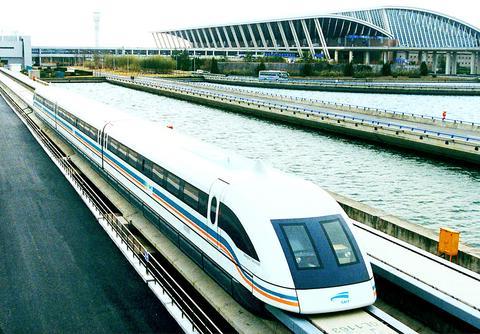A leading railway technology researcher on Friday said most Chinese experts do not favor the use of magnetic levitation technology, or maglev, for a planned high-speed link between Beijing and Shanghai.
"Most of the experts consider it is rational to stick to conventional railway technology [for the Beijing-Shanghai line]," Wang Derong (
A maglev line would be too expensive and too hard to integrate with conventional lines, said Wang, a retired railway engineer who has researched technology for the proposed Beijing-Shanghai line for the past 10 years.

PHOTO: AP
A conventional line would cost only about half as much as a maglev one, he said.
Wang's comments follow a China Daily report saying China has abandoned plans to build a high-speed magnetic-levitation railway between Beijing and Shanghai.
The reports say that China has decided to build less expensive conventional trains instead.
A maglev system can cost up to 300 to 400 million yuan (US$36 to US$48 million) per km, twice that of wheel-track lines, the paper said.
The paper, citing unidentified sources, said Premier Wen Jiabao (
The Railways Ministry had no immediate public comment on the matter. At least one newspaper, the Beijing Morning Post, said the decision to abandon the maglev plan had not been finalized.
The scrapping of the nine-year-old maglev notion -- two weeks after the country's first maglev, a short stretch in Shanghai, began regular operation -- represents a setback for the development of maglev technology in China, which many had seen as one of maglev's key markets.
It also appears to open the market for alternatives on the proposed Beijing-Shanghai line.
Other options for the railway, according to state media, include styling it after the Shinkansen, Japan's high-speed bullet train, or two methods used in France -- TGV and Inter-City Express. The Shanghai maglev is German-built.
German Chancellor Gerhard Schroeder said Friday he still believes there are chances for the German Transrapid consortium in China, despite the reports that China will not use the group's maglev technology for the Beijing-Shanghai line.
In comments aired on German, Schroeder said he believed "that the train which functions well ... will have its chances" in China.
China began daily runs of the world's first commercially operated maglev in Shanghai on Jan. 1, but the US$1.2 billion German-built system spans only 30 km. It connects Shanghai to its 3-year-old airport, the city's second.

‘SWASTICAR’: Tesla CEO Elon Musk’s close association with Donald Trump has prompted opponents to brand him a ‘Nazi’ and resulted in a dramatic drop in sales Demonstrators descended on Tesla Inc dealerships across the US, and in Europe and Canada on Saturday to protest company chief Elon Musk, who has amassed extraordinary power as a top adviser to US President Donald Trump. Waving signs with messages such as “Musk is stealing our money” and “Reclaim our country,” the protests largely took place peacefully following fiery episodes of vandalism on Tesla vehicles, dealerships and other facilities in recent weeks that US officials have denounced as terrorism. Hundreds rallied on Saturday outside the Tesla dealership in Manhattan. Some blasted Musk, the world’s richest man, while others demanded the shuttering of his

TIGHT-LIPPED: UMC said it had no merger plans at the moment, after Nikkei Asia reported that the firm and GlobalFoundries were considering restarting merger talks United Microelectronics Corp (UMC, 聯電), the world’s No. 4 contract chipmaker, yesterday launched a new US$5 billion 12-inch chip factory in Singapore as part of its latest effort to diversify its manufacturing footprint amid growing geopolitical risks. The new factory, adjacent to UMC’s existing Singapore fab in the Pasir Res Wafer Fab Park, is scheduled to enter volume production next year, utilizing mature 22-nanometer and 28-nanometer process technologies, UMC said in a statement. The company plans to invest US$5 billion during the first phase of the new fab, which would have an installed capacity of 30,000 12-inch wafers per month, it said. The

MULTIFACETED: A task force has analyzed possible scenarios and created responses to assist domestic industries in dealing with US tariffs, the economics minister said The Executive Yuan is tomorrow to announce countermeasures to US President Donald Trump’s planned reciprocal tariffs, although the details of the plan would not be made public until Monday next week, Minister of Economic Affairs J.W. Kuo (郭智輝) said yesterday. The Cabinet established an economic and trade task force in November last year to deal with US trade and tariff related issues, Kuo told reporters outside the legislature in Taipei. The task force has been analyzing and evaluating all kinds of scenarios to identify suitable responses and determine how best to assist domestic industries in managing the effects of Trump’s tariffs, he

Taiwan’s official purchasing managers’ index (PMI) last month rose 0.2 percentage points to 54.2, in a second consecutive month of expansion, thanks to front-loading demand intended to avoid potential US tariff hikes, the Chung-Hua Institution for Economic Research (CIER, 中華經濟研究院) said yesterday. While short-term demand appeared robust, uncertainties rose due to US President Donald Trump’s unpredictable trade policy, CIER president Lien Hsien-ming (連賢明) told a news conference in Taipei. Taiwan’s economy this year would be characterized by high-level fluctuations and the volatility would be wilder than most expect, Lien said Demand for electronics, particularly semiconductors, continues to benefit from US technology giants’ effort